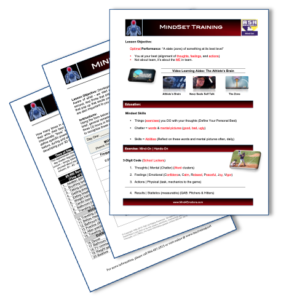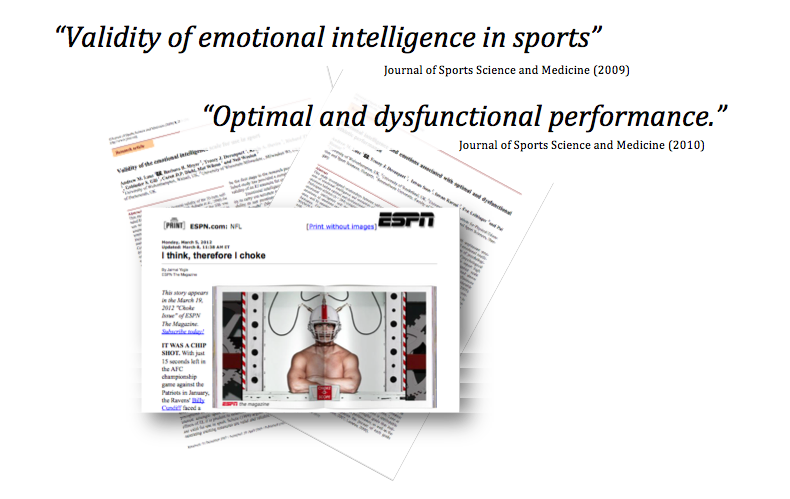Emotional Intelligence for Sports & Athletics
We keep learning new mental & emotional skills simple –
Our instructional design and best practices support the development of two specific innovative competency models – Emotional Quotient and Mental5.
The five (5) core competencies of emotional intelligence are now considered innovative braining training. Our critical-decision making models (proprietary) provide quick, simple and on-demand thought-processes athlete’s can use when feeling the pressure.
Based on a variety of supporting evidence found in the field of Neuroscience and demonstrated by new brain training techniques featured by the US Department of Defense, our MindSet Training System is the new strong for personal performance in the clutch.
-
 The Athlete Brain Documentary (Must Watch)It's finally dawning on athlete's that it's brains, not just brawn that delivers
The Athlete Brain Documentary (Must Watch)It's finally dawning on athlete's that it's brains, not just brawn that delivers -
 Chatter IntroductionUnderstanding "Chatter" is the foundational stepping stone for all development.
Chatter IntroductionUnderstanding "Chatter" is the foundational stepping stone for all development. -
 Mental & Emotional Training ProgramYou train your body for nutrition, now train your mind for emotions.
Mental & Emotional Training ProgramYou train your body for nutrition, now train your mind for emotions.
EQ Education

Classroom instruction and education are critical building blocks to understanding the latest in science and human development.
The instructional design takes complicated topics such as thoughts and emotions and introduces simple models for self-checking to achieve optimal states.
Two (2) sets of skills are introduced in the program, mental skills or critical thinking skills, and emotional intelligence skills to help mitigate the emotional brain’s ability to highjack – otherwise known as “The Choke”.
Four (4) Lesson Plans – 16 instructional hours for the complete program. Results can be improved within the first classroom instruction and field application.
Strength & Conditioning

In the same way we have learned to strengthen and condition the body we are now learning to take the brain into the weight room.
Out of class exercises, field tools and learning aides are all proprietary, proven and effective in developing mental and emotional skills allowing optimal states – aka “The Zone” to be achieved on demand.
Simple Models:
M.E.F. – developing focus, self-awareness and self regulation skills.
T.E.A. – developing rapid recovery and corrective action strategies.
Word Clusters – a string of words creating positive triggers for a specific task.
Fundamental Training

Mental 5 – Learning to Regulate the Chatter (Tate 2013) was the first step in better understanding how the mind and emotions come into play with athletic performance.
There are several mental books on the shelf today. The effective books will teach mental skills to mitigate the power of the emotional brain. Without this critical link between the thinking brain and emotional brain – humans choke.
Originally written for his four children – all of which were raised as athletic competitors in their chosen sport. In 2013 the two oldest were in Junior High School.
As a professional instructional designer, Parrish wrote the book based on simple adult learning principles for a Jr. High academic level. Whereby taking complicated subjects like thoughts and emotions and creating simple models and ideas to improve understanding – and skill.
Special Project: Warren Morris
Master Trainer and designer Parrish Owen Taylor and Warren Morris has a unique opportunity to work together. Recapping the famous walk-off home run giving LSU another College World Series, Warren talks about his “chatter” and the value of “word clusters”.
-
 Mental5 with Warren Morris (01 Thought Awareness)Check out this learning aide introducing the Mental Skill of Self Awareness to T
Mental5 with Warren Morris (01 Thought Awareness)Check out this learning aide introducing the Mental Skill of Self Awareness to T -
 M.E.T. Instructor Parrish TaylorListen as Parrish talks about the program and how to improve sports performance
M.E.T. Instructor Parrish TaylorListen as Parrish talks about the program and how to improve sports performance -
 Mental5 with Warren Morris (02 Emotional Awareness)
Mental5 with Warren Morris (02 Emotional Awareness) -
 Mental5 with Warren Morris (03 Word Clusters)What top performing athletes "DO" inside by developing their mental menu list an
Mental5 with Warren Morris (03 Word Clusters)What top performing athletes "DO" inside by developing their mental menu list an
Testimonial: NCAA Division 2 Athletic Director
“The MindSet program teaches a young athlete how to focus better, and eliminate the distractions and negative thoughts that affect their actions. I have found myself practicing many of the strategies with good results.
Florida Institute of Technology – Mr. Bill Jurgens
Documentaries & Promos:
-
 Bigger Faster StrongerI was that athlete in the 80's learning to develop the body to perform at higher
Bigger Faster StrongerI was that athlete in the 80's learning to develop the body to perform at higher -
 EQ4 Athletics: Chatter Introduction with Parrish"Chatter" is the key for human development. Understanding "chatter" and how to
EQ4 Athletics: Chatter Introduction with Parrish"Chatter" is the key for human development. Understanding "chatter" and how to -
 MindSet Emotions Training ProgramDesigner, Instructor and Coach - Parrish Owen Taylor introduces you to the Menta
MindSet Emotions Training ProgramDesigner, Instructor and Coach - Parrish Owen Taylor introduces you to the Menta -
 MET ProgramYou train the body, now train the mind for emotions.
MET ProgramYou train the body, now train the mind for emotions. -
 Mental5 PromoThe heart keeps pumping and the lungs keep breathing - just like your chatter ke
Mental5 PromoThe heart keeps pumping and the lungs keep breathing - just like your chatter ke -
 Promo: More Cameras?More fits of rage or just more cameras capturing the child like behavior
Promo: More Cameras?More fits of rage or just more cameras capturing the child like behavior
Choke Prevention: Understanding the emotional highjack
Coaches and players at all competitive levels can directly benefit from building their mental and emotional skill sets. By learning to be intelligent (mental skills) about feelings (emotional skills) an athlete directly improves personal performance in the clutch; as well as life and relational benefits off the field. The social competencies of Emotional Intelligence directly impact leadership influence for coaches and team-unity among players.
 Only recently have we been able to take the mind into the weight room and begin to understand the complex thoughts and critical thinking skills of top performers. Now, based on modern technology we can teach new skill sets in the clutch while better understanding the “choke”.
Only recently have we been able to take the mind into the weight room and begin to understand the complex thoughts and critical thinking skills of top performers. Now, based on modern technology we can teach new skill sets in the clutch while better understanding the “choke”.
View Scholarly Articles
[instagram-feed feed=1]













